

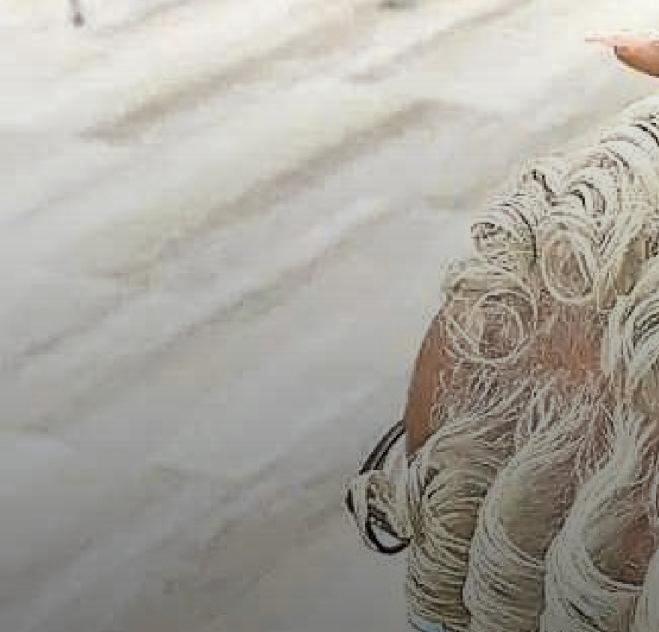




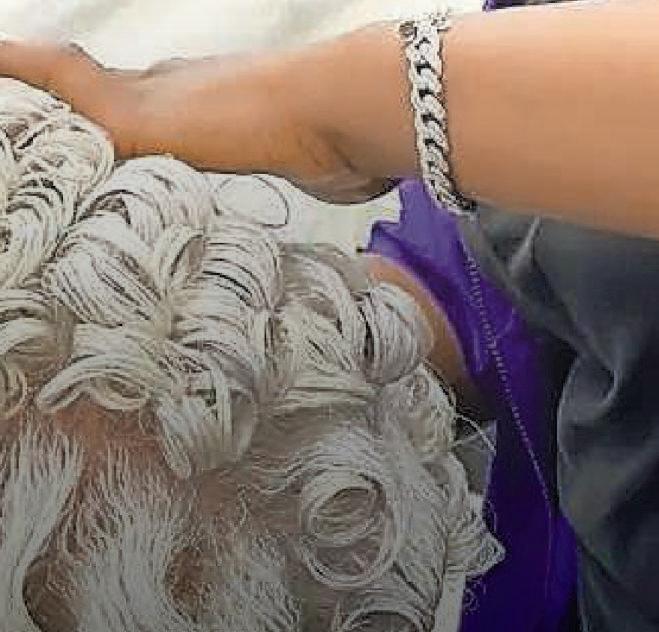


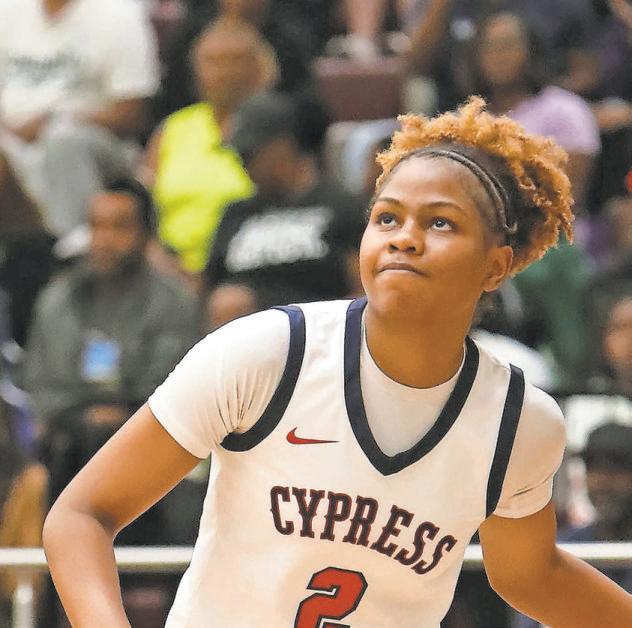


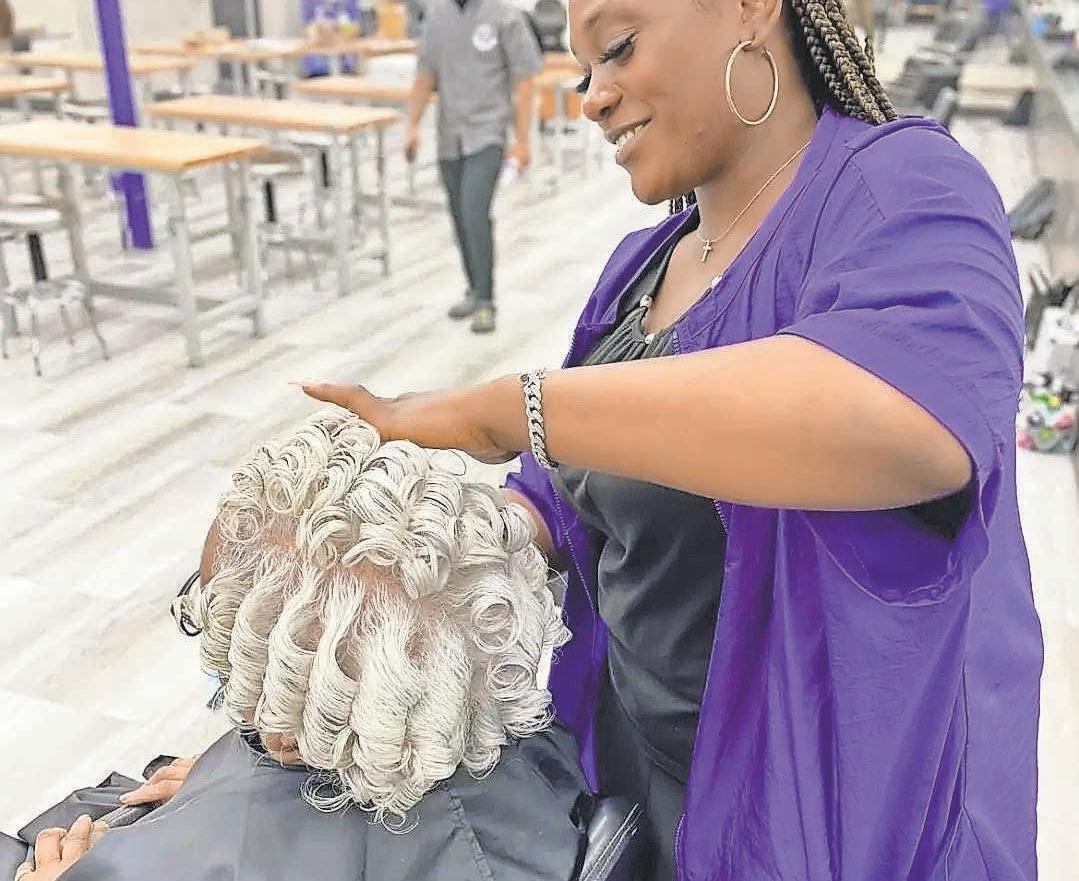























Every February, like clockwork, whitefolk emerge from the depths complaining about Black History Month and demanding a white one. Our completely understandable response has been, “Every month is white History Month. We don’t need a special designated month.” However, I beg to difer. Whitefolk (and all folk) absolutely deserve an annual spotlight on white history. Tere’s too much white history that never gets taught in our schools. White history like the 1999 King vs. Jowers case that saw a jury conclude a conspiracy involving unnamed government agencies contributing to MLK’s murder. White history like evidence laid out in multiple places including Stuart A. Reid’s book “Te Lumumba Plot: Te Secret History of the CIA and a Cold War Assassination” that verify America’s hand in the assassination of the democratically elected leader of the Congo, Patrice Lumumba. White history like the 1963 terroristic bombing of Birmingham’s 16th Street Baptist Church. Te stealing of over 12 million acres of Black-owned farmland. Te denial of GI benefts to Black vets. Te eating of revolt leader Nat Turner. Yes, they ate him afer they tortured, lynched and mutilated his body, per scholarship shared in the book “Te Delectable Negro” by Vincent Woodard. Te real Tanksgiving story of pilgrims engaging in cannibalism. Te USA serving as the model and inspiration for Nazi Germany according to eye-witness accounts shared in James Q. Whitman’s book “Hitler’s American Model.” Te two men who murdered Emmett Till getting of scot free, then getting paid handsomely by Life Magazine to tell the story of how they killed Emmett Till. Te fact that I could go on and on underscores why we really do need a white History Month.
It’s not the economy, stupid
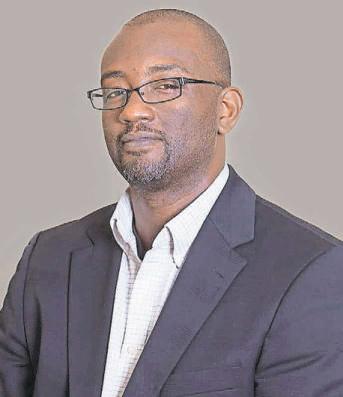
current U.S. system of democracy is ineffective at removing people from political power who he and his crew despise: folk who believe in equality, democracy, civil rights, and equal protection under the law. Te solution? A CEO to run the U.S. corporation. Yarvin publicly said, “An actual CEO is what’s called a dictator. It’s the same thing. Tere’s no diference between CEO and dictator. If Americans want to change their government, they’re gonna have to get over dictator phobia.” Tis is what’s driving the Trump/Vance/Musk bus… as the price of eggs continues to soar.
Shrinking citizens
For the gazillionaires behind the Trump/Vance ticket, last November’s election was never about the economy or the price of eggs. It was about the hyper-wealthy enjoying unincumbered, unchallenged power forever. And for them, democracy was a problem. Enter VP Vance, who is a disciple of Curtis Yarvin. All of Vance’s political viewpoints and ideas come from Yarvin. Vance said in an interview that he wanted to rip out the current political system “like a tumor.” Yarvin called the U.S. government a large system that needs to be destroyed. Same thing. Like Yarvin, Vance believes the
FYI, DEI hires aren’t “unqualifed.” Just the opposite. As thought leader Lurie Daniel Favors puts it, DEI math shows that because Blackfolk have always had to be twice as good to get half as much in this country, by the time we get hired, we’re four times more qualifed than our professional counterparts. But ending DEI also means ending the part of DEI that always gets ignored. DEI is actually DEIA: diversity, equity, inclusion and accessibility. Te 1973 Section 504 of the Rehabilitation Act requires that buildings are wheelchair accessible. It also requires K-college teachers, doctors, etc. to provide their information in ways accessible to individuals with various disabilities. Most people reading this have never known a world where such accessibility provisions weren’t the norm. But the anti-DEI folk are hellbent on ending accessibility (even Texas Gov. Greg Abbott). In their world, the disabled, like Blackfolk and other POC, aren’t worthy of full citizenship. Tere are even reports of retailers discontinuing the sale of plus-size clothing, shrinking even more the defnition of “acceptable American.” Tey (MAGA Republicans) have already targeted unwed women, childless women, liberals, and the college-educated as targets for having rights restricted, leaving only white males with unfettered access to full citizenship. If only they had written about their nefarious plans before we voted last November (cough, cough… Project 2025).
On the web
• Fighting HIV stigma in Houston’s Black community.
• NAACP calls for boycott of anti-DEI companies.
• HS Sports: Houston’s Best compete for Guy V. Lewis Award.
Violent crime in Houston increased in 2024, marking a more than 4% rise from the previous year, according to preliminary data released by the Houston Police Department (HPD). However, despite the uptick, crime levels remain below those recorded in 2020, when more than 30,000 violent crimes were reported.
Te data shows that HPD received reports of nearly 27,000 violent crimes last year, interrupting a steady decline since 2020. Violent ofenses include murder, rape, robbery, aggravated assault, kidnapping, and human trafcking. Much of the recent increase was driven by aggravated assault, which spiked 9%—rising from under 17,000 incidents in 2023 to more than 18,000 in 2024. While robberies and murders declined, reports of rape and human trafcking saw increases.
HPD Assistant Chief Megan Howard noted that some crime categories have risen due to increased investigations and reporting. Human trafcking cases, for instance, jumped 30%, from 71 incidents in 2023 to 92 in 2024, largely due to a shif in the vice division’s focus from prostitution to trafcking.

Law enforcement officers investigate the scene of shooting in Houston.
Credit: AP
“Te notable category with the largest percentage increase is human trafcking,” Howard said. “Human trafficking investigations are almost exclusively going to be a result of our proactive investigations,
and so what this means is when you see the increase, it’s actually a refection of a shif in priorities.”
While most violent crime categories have declined since 2020, reports of rape have
bucked the trend, increasing from about 1,400 cases fve years ago to 1,600 last year. Howard attributed the rise to improved reporting, crediting outreach eforts and strengthened partnerships with victim advocacy groups and women’s shelters.
“We do think that some of our outreach eforts—some of our improvements in how we work with our victim services, our victim advocates, our relationships that we’ve built with women’s shelters—has improved the reporting,” Howard explained. “Tis is a crime that is very underreported, and it is also grossly disproportionately committed by intimate partners and acquaintances, and they’re known suspects. Tere’s a whole host of reasons that these crimes go unreported and underreported.”
Meanwhile, nonviolent crimes—including burglaries, thefts, and auto thefts— declined by more than 6% from 2023 to 2024, contributing to a slight overall drop in total reported crimes. Te nearly 100,000 nonviolent crimes recorded in 2024 still made up the majority of cases, but their decline helped offset the rise in violent ofenses.
By ReShonda Tate
Houston Mayor John Whitmire is making good on his promise to root out inefciencies in city spending, unveiling the results of a sweeping efciency study conducted by Ernst & Young. Te study reveals signifcant waste, including redundant leadership structures, improper use of city credit cards, and inconsistencies in vendor contracting.
“Tere have been glaring inefciencies and duplications for years, but that ends now,” Whitmire declared.
For months, the mayor has pointed to this study as a critical step in eliminating wasteful spending before considering any tax increases. He reiterated his stance, saying, “Until we did the best we could to eliminate waste, duplication, and corruption, I would not seek additional resources.”
Te study’s release comes as Houston faces a projected $330 million budget shortfall in 2026. Its fndings include:
• Vendor contracts lacking consistency, with multiple agreements for similar services across departments at different pricing levels.
• Inefcient city leadership structures, with more than 40% of supervisors overseeing fewer than four employees.
• Employees spending over 30% of their time on administrative tasks, such as reading and responding to emails.
• A lack of performance-based metrics, with only 37 out of 606 key performance
indicators focused on actual outcomes rather than output.
Savings without layoffs?
Whitmire’s Chief of Staf, Chris Newport, emphasized that the report does not recommend job cuts but instead aims to improve spend management, potentially reducing costs by up to 15%.
“There should be productivity and cost savings from a clearer focus on the work that matters, reorganizing departments, and utilizing vacant positions,” Newport said.
Newport requested City Council approval for further work with Ernst & Young to renegotiate vendor contracts and implement cost-saving strategies.
Performance, structural issues
Te study found that Houston lags behind other cities in emergency response times, crime rates, and income inequality. It also recommended a shif toward evaluating outcomes rather than simply measuring the volume of work done.
“Tat is a huge defciency,” Council Member Julian Ramirez said. “If we’re not measuring correctly, we run the risk of just throwing money at a problem.”
A key structural issue identified was an overabundance of supervisors managing small teams, leading to inefciency.
“If you have too many leaders, you become top-heavy,” said Cynthia Wilson, Special
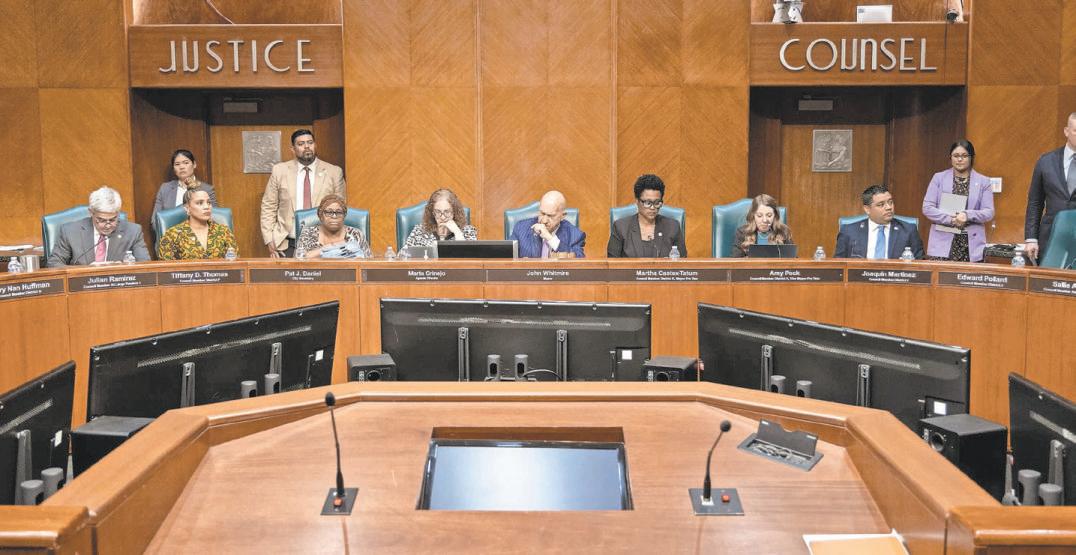
Advisor for Organizational Culture and Education. “A lack of consistency in messaging creates confusion. We need common language and a shared vision to operate efciently.”
Wilson assured city employees that the goal is optimization, not job cuts.
Forensic accounting findings
Te study also conducted a forensic accounting review, which uncovered questionable fnancial activity over the past six years, including:
• Vendors skirting city council approval requirements for purchases over $50,000.
• Improper use of city credit cards, prompting a new fnancial monitoring system to fag suspicious activity.
City Council members signaled support for
further action based on the study’s recommendations. Te mayor’s ofce plans to present an additional contract for City Council approval to continue refning city operations.
Te mayor’s ofce is already working with department heads to streamline operations and improve efciency.
“We must become more efficient,” Newport said. “Having more than 40% of supervisors managing three or fewer employees is unsustainable. We’re actively addressing this issue.”
Whitmire’s administration views this study as a blueprint for fnancial responsibility, ensuring that every dollar spent is maximized for impact—without additional tax burdens on residents.
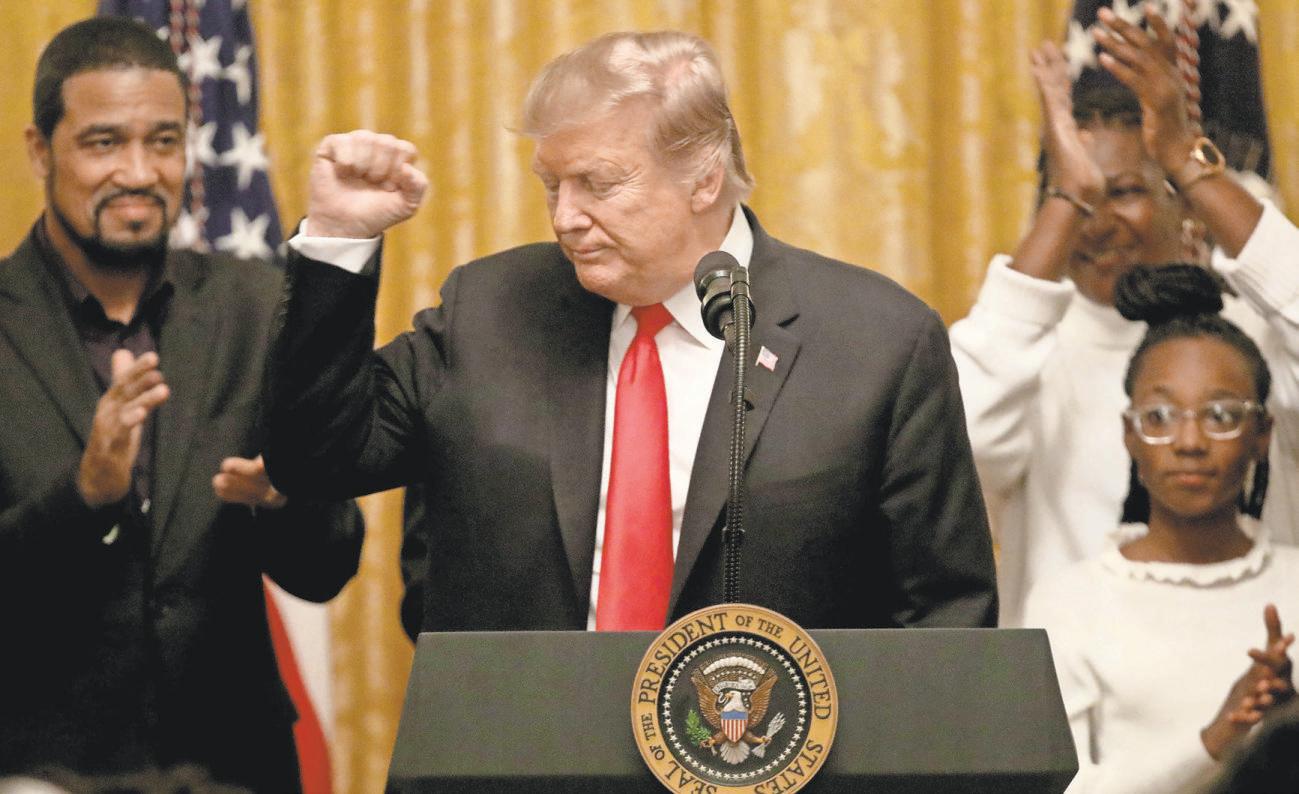
By ReShonda Tate
The Trump administration recently hosted its White House Black History Month Celebration—a striking contradiction as it continues its nationwide assault on Diversity, Equity, and Inclusion (DEI) initiatives.
“Acknowledging Black History Month while simultaneously rolling back DEI initiatives defnitely sends a mixed message,” said Parker McMullen Bushman, founder and CEO of Ecoinclusive Strategies.
White House Press Secretary Karoline Leavitt reaffirmed the administration’s stance, stating, “We will continue to celebrate American history and the contributions that all Americans, regardless of race, religion or creed have made to our great country. America is back!”
Yet, just weeks before, President Donald Trump issued a proclamation recognizing Black History Month, following the tradition of past presidents. Te proclamation highlighted historical fgures such as abolitionists Frederick Douglass and Harriet Tubman, along with Supreme Court Justice Clarence Tomas. Trump’s statement claimed that their achievements “have monumentally advanced the tradition of equality under the law in our great country” and remain a continued inspiration.
However, even as the White House acknowledged Black History Month, its actions told a diferent
story. Around the same time, the Department of Defense (DOD) issued a directive declaring that “identity months” were now ofcially dead.
Dismantling DEI while hosting a celebration Te conficting messages come as the Trump administration aggressively targets DEI programs, referring to them as “discriminatory” and pushing for what it calls a “merit-based society.” Te White House’s Black History Month proclamation encouraged “public ofcials, educators, librarians, and all the people of the United States to observe this month with appropriate programs, ceremonies, and activities.” Yet, it failed to defne what “appropriate” actually means.
Meanwhile, a Defense Department memo titled “Identity Months Dead at DOD” made it clear that federal resources—including work hours—would no longer be used to recognize cultural awareness months. Black History Month, Women’s History Month, and National Disability Employment Awareness Month are now among the observances barred from ofcial acknowledgment within the DOD.
While Bushman acknowledged the importance of recognizing Black History Month, she emphasized that true support should go beyond performative gestures.
“Black history is American
NNPA
The NAACP has filed a lawsuit challenging the legality of the Trump administration’s decision to dismantle the Consumer Financial Protection Bureau (CFPB). The civil rights organization argues that the move undermines protections for Black, elderly, and vulnerable consumers, leaving them exposed to fnancial exploitation.
NAACP President and CEO Derrick Johnson condemned the administration’s actions, calling them a reckless assault on consumer protections.
headquarters, taking steps to cancel its lease. Vought also suspended all investigations, rulemaking, public communications, and enforcement actions.
Keisha D. Bross, NAACP director of opportunity, race, and justice, said the organization maintains its commitment to restoring the bureau’s critical role in protecting consumers.
history… and so I think that if the administration truly wants to honor Black history, it would recognize that diversity is not a threat, but it’s our greatest strength as a nation,” Bushman said. “When we talk about diversity, it’s not excluding people who are white, people who are able-bodied, people who are cisgender, people who are heterosexual, right? It’s saying, ‘Let’s add to it so that all of us together can thrive.’”
HBCU leaders sound the alarm
Despite the administration’s attempts to paint the White House celebration as a genuine acknowledgment of Black contributions, concerns are mounting—especially among Historically Black Colleges and Universities (HBCUs).
Republican commentator Armstrong Williams, who attended the White House event, expressed optimism. Speaking to Black Press USA, he claimed that the administration’s focus on HBCUs, “strengthening families, and strengthening business” would usher in a new “renaissance” for Black wealth.
However, HBCU leaders remain skeptical, particularly as Trump’s executive orders threaten DEI programs and put federal funding for Black colleges in jeopardy. Williams acknowledged the controversy but insisted, “People will absolutely be shocked. He [Trump] will build his legacy and that will be a part of it. Tis is something he is really committed to.”
“Once again, we are witnessing the dangerous impacts of an overreaching executive ofce. Te Trump Administration’s decision to dismantle the Consumer Financial Protection Bureau opens the foodgates for unethical and predatory practices to run rampant,” Johnson stated. “We refuse to stand idly by as our most vulnerable communities are lef unprotected due to irresponsible leaders. From seniors and retirees, disabled people, and victims of disaster to so many more, our nation stands to face immense fnancial hardship and adversity as a result of the elimination of the CFPB. If our president refuses to put people over proft, the NAACP will use every tool possible to put Americans frst.”
Te lawsuit comes afer a series of drastic actions following the ouster of CFPB Director Rohit Chopra. President Trump replaced Chopra with Russell Vought, who immediately instructed staff not to perform any work tasks and ordered the closure of the agency’s
“Te CFPB is an agency of the people. From the protection from junk fees to fghting excessive overdraf fees, providing assistance to impacted victims of natural disasters, and holding predatory practices accountable, the NAACP stands frm in bringing back the CFPB,” Bross said. “Te NAACP will fght to hold fnancial entities responsible for the years of inequitable practices from big banks and lenders.”
The lawsuit details the harm already inflicted by the agency’s closure. Among those afected is Rev. Eva Steege, an 83-year-old pastor with a terminal illness who was seeking student loan forgiveness through a CFPB-facilitated program. Her meeting with CFPB staf was abruptly canceled, leaving her without recourse to resolve her debt before passing.
If successful, the lawsuit could force the administration to reinstate the agency and resume its enforcement actions against financial institutions accused of predatory practices. “Neither the president nor the head of the CFPB has the power to dismantle an agency that Congress established,” the plaintifs argue.
By Laura Onyeneho
Can you remember your frst experience with the police?
Law enforcement is meant to serve and protect, but for many Black Americans, interactions with ofcers are flled with anxiety and fear. Parents of Black children across the U.S. know this reality all too well. Tey sit their kids down for “the talk,” preparing them for the day they may be stopped simply because of their skin color.
Te tragic deaths of young Black Americans at the hands of police have intensifed concerns about these encounters. Cases such as Sandra Bland, Duante Wright, Breonna Taylor, Atatiana Jeferson and Botham Jean highlight the deadly consequences of racial bias in policing.
Tese individuals were killed in situations where police misconduct and excessive force played a central role, underscoring the urgent need for Black youth to be aware of their rights and how to handle police interactions.
Camille Gibson, a faculty member at the College of Juvenile Justice at Prairie View A&M University (PVAMU), says a deep-rooted history shapes these interactions.
“Historically, there has been that history of distrust for very good reasons,” she says. “From slavery, where law enforcement helped maintain the system, to today, where negative assumptions about Black youth—based on how they dress or express themselves—can turn deadly.”
Many Black people are unaware of their legal rights during police stops. Gibson references the 1980s Supreme Court case Florida v. Bostick, where Justice Turgood Marshall noted that Black Americans ofen feel they cannot say no when law enforcement asks to search their belongings.
“Many folks in America can say no, but the Black man in America would not feel that he could say no,” Gibson says.
One common legal misunderstanding is that an ofcer cannot search a person’s pockets unless they have probable cause.
“If an ofcer only has a reasonable suspicion, they are not legally allowed to conduct a full search unless they feel something that resembles a weapon during a pat-down,” says Gibson. However, not all ofcers strictly adhere to these rules, which can lead to unlawful searches and arrests.
DURING A POLICE STOP
Knowing one’s rights is not just about avoiding legal trouble—it can be a matter of survival for young Black people.
“For Black folks, it’s a matter of life
and death, unfortunately,” Gibson states.
“While the media ofen focuses on cases like George Floyd and Breonna Taylor, there are countless other instances where Black individuals have been unfairly targeted, mistreated, or even killed during routine stops.”
Brian Klosterboer, senior staf attorney at the ACLU of Texas, says that the legal protections people have in theory do not always align with reality. “We all have rights when we encounter police, but unfortunately, what the courts say is not always what happens in reality,” he explains. “We have seen police cross constitutional lines, using excessive and even deadly force when they’re not supposed to.”
Klosterboer ofers several key tips:
Have proper documentation ready
Keep your driver’s license, registration, and proof of insurance easily accessible to avoid unnecessary complications.
Start recording
If possible, begin recording the encounter on your phone. However, Klosterboer warns, “Police ofcers sometimes mistake a phone for a weapon, so always announce what you’re doing before reaching for it.”
Comply in the moment, challenge later
Klosterboer notes, “Even if an ofcer’s order is unconstitutional, resisting can result in additional charges. It’s safer to comply and challenge the situation later.”
Stay in Your Car
“You’re not supposed to get out of the car unless the ofcer asks you to,” says Klosterboer. Exiting the vehicle unprompted can escalate the situation.

Do not consent to a search “Always say NO,” he advises. Klosterboer adds that officers may use vague language to get consent: “Tey might ask, ‘Can I just take a quick look in your bag?’
It’s crucial to calmly and frmly say, ‘I do not consent.’”
Remain Silent
If you are arrested or if an ofcer fnds something suspicious in your vehicle,
For Black folks, it’s a matter of life and death, unfortunately. While the media ofen focuses on cases like George Floyd and Breonna Taylor, there are countless other instances where Black individuals have been unfairly targeted, mistreated, or even killed during routine stops.”
do not argue or try to explain. “Put your hands behind your back and stay quiet. Anything you say can and will be used against you,” warns Klosterboer.
Gibson stresses that education about police interactions should start at home and in schools.
“Parents should remind their children about the importance of keeping their hands visible, avoiding sudden movements, and following instructions during a trafc stop,” she says.
Schools and community organizations can also play a role by hosting workshops on legal rights and police encounters.
Te Texas Department of Public Safety provides guidelines for fling complaints about police misconduct, which can be found on the back of trafc tickets. However, many Black individuals historically have been skeptical about whether fling complaints leads to real consequences.
“Tere are complaint mechanisms with each law enforcement agency and local governments, and organizations like the Houston Police Accountability Collaborative work with pro bono attorneys to address police misconduct,” Klosterboer says.
By ReShonda Tate
The year was 1915. The Great Migration saw thousands of Black people making their way from the South to the North, the Harlem Renaissance was underway and the world was just fifty years removed from slavery.
Nestled in a quiet neighborhood in San Antonio, Nobia Franklin wanted more than a Jim Crow life would allow.
Though San Antonio’s Black population sat at less than 5%, Franklin built a business offering beauty products to Black patrons. She toiled at her job for five years, trying to grow her business and branching out to open schools to teach young cosmetology students.
After opening locations in Houston and Dallas, Franklin joined the thousands of Black people heading North, moving to Chicago in the early 1920s. When she died in 1934, she passed her blossoming business on to her daughter, Abby, and son-in-law, J.H. Jemison. Many Black people had settled for life in the Windy City, but the Jemisons longed for the South. Soon, they closed the Chicago location, moved to Houston and took the business there back over.
DECADES OF THRIVING
Known at the time as Franklin Beauty School, the Houston location would find prosperity for the next 34 years. Abby and J.H. Jemison turned the business over to their son, Ronald Jemison Sr., and his wife Glenda in 1969. Their children, Ron Jemison Jr. and his brother Sean, officially entered the business in 1999. Now, Ron Jemison Jr. and his wife, Zameika, have begun training the fifth generation to lead the business now known as The Franklin Institute. Their daughter, Brea, is a licensed stylist with a salon (BeeCrowned), which has been in operation for several years.

something better for their kids than what they had. So the path was we always worked in the company, cleaning up, filling up Coke machines, those types of things.”
Because the business wasn’t forced on them, Jemison Jr. says they were able to carve their own path.
current owners have honest discussions about whether a family member will take over the business. That enables them to pivot and pursue other options that will help the business they’ve built,” said Saviano.
After graduating from Hampton University with a degree in business management, Jemison Jr. headed to corporate America.
– my family business,” he said. He stumbled on a book called “Styling Jim Crow” and became fascinated.
Ron Jemison Jr. is grateful for the foundation that his family laid.
“Growing up, my parents put us in a position to do whatever we wanted to do,” he said. “My brother and I played sports. We went to private schools, and they just wanted

“I think a lot of parents dream of their kids following in their footsteps. But my parents never pushed that on us. It was something that was just there,” he said. “We were blessed that they were able to keep it going. And so we were able to see things and learn things at different times.”
He acknowledges that being around the business caused him to learn it – without even realizing it.
“We used to always say, if you hang around the barbershop long enough, you’re gonna get a haircut. I think my parents not forcing us, but bringing us along with them to be with them while they were at work was great,” Jemison Jr. said. “I never realized how important learning how to do the basics was.”
Deloitte Tax LLP’s Micaela Saviano, Private Wealth Tax Partner, says that families that run a business should ensure an open dialogue in addition to learning the basics.
“Keep in mind that the next generation might not want to do things the way they’ve always been done. It’s important that the
“I quickly felt stagnated working in corporate America. So I went back to my roots
“I read the book cover to cover in two days. And I learned so much about the company, about my grandfather and about the history of Franklin through that book,” said Jemison Jr., who suggests businesses chronicle their journey in writing. “My father was the youngest of three children, and so he knew some history. But he knew only what he knew.

“Reading that book opened my mind up to how why it was so important to carry this on because reading about him going through the Jim Crow era and all the segregation and the roadblocks that were put in front of him, it felt like the only right thing to do was to continue that legacy.”
At the time, Jemison Jr. didn’t realize his family had used Succession Planning to pass the business down.
“I have a younger brother. We both equally had the chance to step up and take over the business if we chose to. I took it upon myself to want to do more. So I was always asking questions. I think it became a passion for me and my parents could see that,” he said. “You have to be comfortable turning the keys over. And when you do, you have to be open to the idea that they may come to the business with ideas of their own.”
Saviano adds that families need to be okay with bringing outside forces in if their children aren’t yet able to run the business.
“Sometimes the existing generation has a hard time letting go of the way things have always been and sometimes the next generation would like to make some changes,” Saviano said. “That can create conflicts that families need to work through and can enable the younger generation to take the business sometimes in a different direction.”
Currently, Franklin Institute has three locations (6521 Highway 6 North, 13318

Almeda Road, 8030 FM1765, Texas City).
Like his father did for him, the younger Jemison hopes to have a Franklin for each of his children. In the meantime, he has to find a lane for each of his children- just like his father did with him.
“My father wanted so much to have a location for my brother and one for me. And, it would still be under the same umbrella. But what I saw was we both had a lane. We both had different strengths and weaknesses. I was not the marketer, he was. I was more behind the scenes and was the one with the paperwork and making sure the administrative side ran smoothly,” Jemison Jr. said.
And now, Jemison Jr. is excited about training up his own children to continue the legacy.
“So now, I’m trying to find my children’s strengths and weaknesses, and that puts them into doing what they like instead of doing something they don’t. It’s surreal to me to be in the family, but it’s exciting for me to see that my kids gravitate to the business and understand all that you get out of it,” Jemison Jr. said.
“My parents were planting seeds that I had no idea that they were planting. And we do the same thing with our kids as well,” he continued.
“And I think that for anyone hoping to pass on their business, you cannot close your mind to sharing the information with your kids of what you do daily. It’s important for them to understand and carry that torch on as well.” For more information visit: https:// franklininstitute.net/.
By Aswad Walker
With a world of institutions and forces seemingly stacked against Black youth, one Houston-area non-profit is on a mission to guide middle schoolers through a journey of self-discovery to chart consciously aligned future educational and career pathways.
or discover their entrepreneurial and philanthropic nature.”
And in today’s sociopolitical climate, Johnson believes what Innerverse offers is needed now more than ever.

Innerverse, founded by longtime educator Angela L. Johnson, utilizes the personal development principles of self-awareness, self-mastery and self-transcendence via its core programs to position participants’ inner genius as the North Star for proper future planning.
Or as Johnson puts it, Innerverse is the auntie or uncle who “puts you up on game about yourself and expects you to activate, and own your own destiny now.”
“We take our children on an exploration dive into Self,” said Johnson. “Through analyzing, sometimes shedding, and honoring their personal layers, they resurface with a refreshed discovery, and appreciation of their gifts. With this foundation of self-confidence, we use our practical application tools to activate their values in alignment with present career options
“Our Texas education system is at a crossroads, with many students—especially those from underserved communities—facing systemic barriers that stifle creativity, limit opportunities, and fail to recognize their unique genius…,” she said. “Meanwhile, social and political polarization can create environments where young people feel unheard, unseen, or disconnected from their own power.
“We provide a space for our children to reclaim their voice, cultivate their genius, and prepare to lead in a world that desperately needs innovative and socially conscious thinkers.”
Since incorporating in 2022, Innerverse has impacted approximately 400 middle schoolers through partnerships with Sanchez Charter Schools, Texas Technical Trade School, Fondren Middle School and South Union CDC. The organization has delivered approximately 70 workshops, but numbers only tell part of
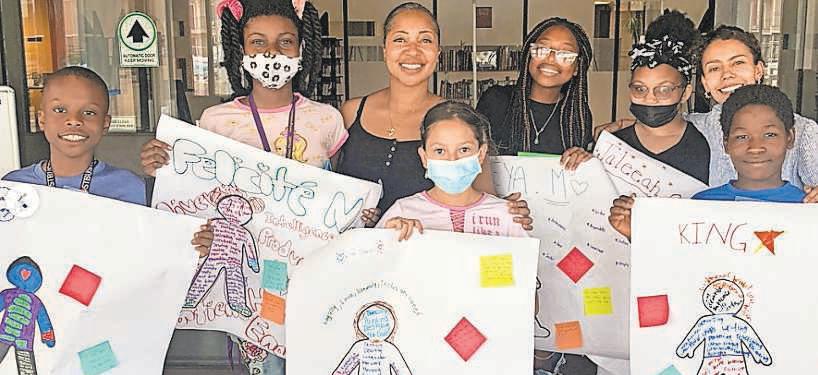
the story.
“The real impact is in the spark we see when a child realizes their own power, in the shift from uncertainty to self-assurance, and in the moment they recognize they are not just students, but creators of their own future,” said Johnson.
Innerverse offers six student-centered workshops that infuse holistic personal development principles blended with practical career preparation activities appropriate for middle schoolers.
“My personal favorite workshop is
The Metropolitan Transit Authority of Harris County, Texas (METRO) is planning to issue the procurement documents listed in this advertisement.
RFP No. Doc1430212213: Turnkey Operation of METRO’s Northwest Bus - Operating Facility. Solicitation will be available on or about 02/10/2025.
RFTP No. Doc1455398352: Wheel Truing Machine Replacement. Solicitation will be available on or about 02/12/2025.
Prospective bidders/proposers can view and download these solicitations by visiting METRO's website at ridemetro.org/Open Procurements. If you are unable to download the documents or are having difculty, please contact 713-739-6886 or email Contracts/Property Services at propertyservices@ridemetro.org.
Downtown Houston+ on behalf of the Downtown Management District (HDMD) will receive responses to this Request for Proposal (RFP), for a Market Producer to recruit and manage local growers, vendors, artisans and makers for markets to be held monthly in each of the Parks HDMD manages. Proposals will be received until 12:00 Noon on Monday, March 17 2025 by email submission to RFP@ DowntownHouston.org with the Subject Line: Market Producer RFP.
Proposals submitted to Downtown Houston+ after the submission deadline, or by any method other than digital proposals submitted by email, will not be accepted. Telephone or mail inquiries regarding this advertisement will not be addressed by Downtown Houston+. Beginning Friday, February 21, 2025 this Request for Proposal (RFP) may be reviewed and downloaded as an electronic fle from the Downtown Houston+ website: http://www.downtowndistrict.org/procurement-rfp-opportunities/ .
Based on the proposals submitted, a review and selection committee will identify the highest-ranked proposal. Staf will negotiate and recommend to the HDMD Board for authorization to contract with the selected producer(s) based on the evaluation criteria. Proposers shall comply with City of Houston Code of Ordinances, Chapter 15, Articles II, V, VI, and XI and the Mayor’s Executive Orders No.1-7 Pay or Play (POP) Program for Houston Public Works for the public procurement procedures of the City of Houston Ofce of Business Opportunity (OBO) established in March 2008 and the entity responsible for the administration of the Minority/ Women-Owned (M/WBE), Persons with Disabilities Enterprises (PDBE), and Hire Houston First programs. The successful Proposer will be required to make good faith eforts to achieve an M/WBE and PDBE participation goal of twenty percent (20%).
‘Expanding Career Notions’ where we get into neuroplasticity, the science of how the brain makes physiological changes to create new thought patterns, shifting from fixed mindsets to growth mindsets,” shared Johnson. However, she says the most popular workshop with students is “Do You Have What it Takes?” This fully interactive workshop includes physical movement, critical thinking, creativity and art design. Through this, students learn the principles of human capital through a highly interactive real-world scenario.
THE HARRIS CENTER FOR MENTAL HEALTH AND IDD REQUEST FOR COMPETITIVE SEALED PROPOSAL
Construction of a Northeast Community Wellness Center
The Harris Center for Mental Health and IDD is requesting Competitive Sealed Proposals pursuant to Chapter 2269 of the Texas Government Code and 2 CFR Part 200 from qualifed construction frms for construction of Northwest Community Wellness Center for consumers served by The Harris Center for Mental Health and IDD. The site will be located at 7529 Little York Road, Houston, TX 77016 Project Number: PUR-FY25-309 . Specifcations may be secured from The HARRIS CENTER, Purchasing Services located at 9401 SW Freeway, Houston, Texas 77074; telephone (713) 970-7279, The HARRIS CENTER website www. theharriscenter.org or the Electronic State Business Daily Site https://portal.cpa.state.tx.us/ beginning Monday, February 3, 202 5. A mandatory in-person Pre-Proposal Conference will be held on Thursday, February 27 , 2025, 10:00 a.m. CST at 9401 Southwest Frwy, Room 104, Houston, TX 77074.
Deadline for prospective vendors to submit questions to this CSP is Wednesday, March 5, 2025, 5:00 p.m . CSP responses must be submitted to Purchasing, 9401 SW Freeway, Houston, Texas 77074 by 10:00 a.m. March 17, 2025, in a sealed envelope marked "CSP - DO NOT OPEN UNTIL–10:00 a.m. March 17, 2025 “Northeast Community Wellness Center CSP ”. A public opening of the proposals will occur immediately following the proposal submission deadline at 9401 SW Freeway, Houston, Texas 77074. Any questions pertaining to this solicitation should be addressed in writing to Sharon Brauner, C.P.M., Purchasing Manager, Sharon.brauner@theharriscenter.org , James Blunt, C.P.M., James.Blunt@theharriscenter.org , and Nina Cook, MBA, CTCM, CTCD, Director of Purchasing, Nina. cook@theharriscenter.org or fax to (713) 970-7682. Minority-Owned Businesses and Women-Owned Businesses are encouraged to participate. The HARRIS CENTER reserves all right to postpone, accept or reject any and/or all proposals as it to waive formalities and reasonable irregularities in submitted documents as it deems to be in its best interests and waive formalities and reasonable irregularities. is not obligated to accept the lowest proposal. This solicitation (CSP) is subject to addenda, including but not limited to, an extension of the submission deadline, communicated through www.theharriscenter.org .
Government agencies, school districts, prime contractors, probate lawyers, and more... use our new self-serve system for placing classified ads


By Laura Onyeneho
American stages often served as platforms for ridicule and distortion of Black people during the early 1800s.
White performers in minstrel shows donned blackface, portraying exaggerated and demeaning caricatures of African Americans for white audiences. Yet, even in these dark moments of cultural appropriation and mockery, Black artists were creating a counter-narrative. Through their authentic storytelling and movement, they revealed truths about the world, challenging stereotypes and reshaping the narrative of what it means to be Black in America.
This history reminds us that representation in the performing arts is about more than entertainment—it’s about confronting societal biases, celebrating diversity and providing a platform for exploring the nuanced Black experience. Black theater makers and dancers have always been at the forefront of this effort, using their craft to educate, entertain and empower audiences.
This legacy continues to thrive in Houston. It reminds us that our past, present and future are interconnected—bound by the stories we tell and the art we create.
Jasmine Hearn, an interdisciplinary artist, performer and organizer, embodies the evolving nature of Black performance art. Hearn grew up in Acres Homes and has extensively explored storytelling through interpretive dance. Hearn is the creator of Memory Fleet: A Return to Matr, a migrating project that focuses on the living memories of their Black dance matriarchs in Houston.
The stories are used to create original sound scores, choreographies, and garments, presenting a site-specific experience, album, feast, online archive, and anthological catalog. Hearn started to ask questions like “How is memory stored? In what ways do we remember our history? How do we archive the lives of mothers?”
“I continue to dance as a way of remembering [and] imagining. How can I continue to
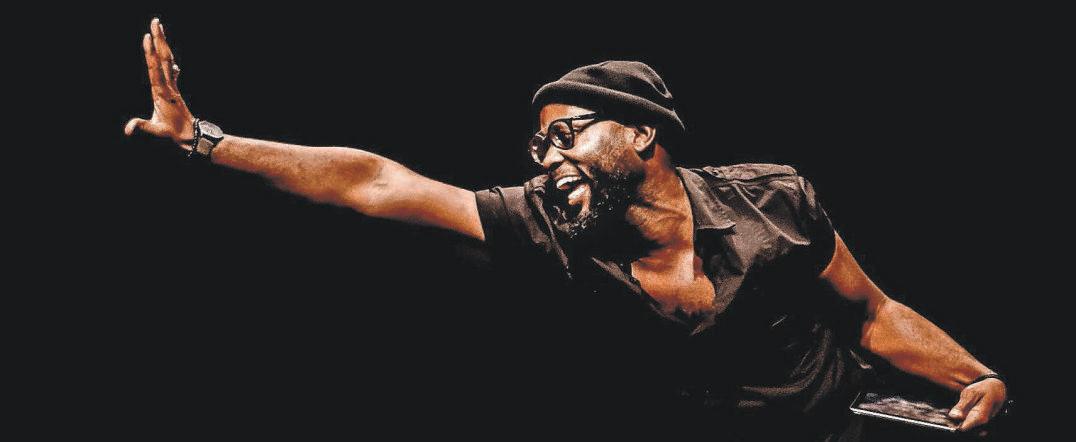

be in Sankofa practice about reflecting about where I come from to then being able to imagine where I want to be… and where I need to be,” Hearn said. “As ways to continue the lineage and considering who is coming after me.”
Hearn said Black artists thrive when in collaboration. Recently, Hearn joined forces and performed with Dr. Lindsay Gary, the founder and executive director of Dance Afrikana, who hosted the Kuumba Festival, a celebration of the creative spirit of the African diaspora. The festival featured dance performances, workshops, and community engagement initiatives showcasing the diversity of Black dances in the diaspora.
“There is this tool of competition that continues to be used by quite a few people in the field that I think doesn’t cultivate nourishing relationships,” Hearn said. “There are ways of isolation that come with that…and mentality
of scarcity to prevail.”
Gary describes Dance Afrikana as more than movement—it’s a reclamation of our stories and heritage. Through dance, Black people can connect the past to the present, allowing people to see themselves in the rhythms, steps, and narratives they perform.
“It allows people to really connect with history and heritage on another level. If we don’t understand how West African dances are connected with hip-hop, then we don’t really understand hip-hop dance,” Gary said. “There is a chronology that we can’t forget about, and we are all cross-culturally influencing each other. It’s not a one-sided thing.”
The Harlem Renaissance and the Black Arts Movement are two examples Gary uses as inspiration for her fight to amplify Black stories through dance. Gary noted Houston native and
dance legend Debbie Allen as a perfect example of how racism almost derailed her career but never stopped her from becoming one of the greats we see today.
“Black artists have paved the way in many ways and opened so many doors. Black artists have contributed to things being desegregated to stages and theaters,” she said. “There’s only room for us to build on other people’s legacies that they’ve left for us.
Access to resources, funding, and opportunities is essential for Black artists to continue to thrive. For over a decade, Denise O’Neal has made it her purpose to elevate theatre production as a go-to resource for artists of color. She is the executive director of Fade To Black, a short play festival that showcases new works by African-American playwrights.
The festival is produced by her minority-led non-profit organization, Shabach Enterprise. It is volunteer-supported, culturally diverse, and community-based, employing over 600 local artists of color and producing more than 150 performances.
“It’s about collaboration…alliances…favor… who you know. You could be a really great writer and not know the right people or have the right system around to propel your work forward,” O’Neal said. “That was the disconnect between some of my African-American playwrights and some of [the] white playwrights.”
From June 8-14th, Fade to Black will introduce its first Arts Festival to kick off the Juneteenth holiday. The festival is Houston’s first and only national short play festival to spotlight new 10-minute plays of African-American playwrights.
“The playwrights have a director, a cast, this community that we bring to support them, so when it gets to the stage, it is its best rendering,” she said. “It’s in that hope that someone will see them and say, ‘Hey, that was a good piece. Do you have something longer? Or do you have something that I could produce?’ That’s how it starts.”
By Terrance Harris
Sometimes, it’s a perfectly timed smile in the huddle or a not-so-perfectly-timed dance move while receiving instruction in practice. Regardless, Texas Southern sophomore guard Aylasia Fantroy somehow brings calm to her coach.
It’s the silly things for TSU coach Vernette Skeete.
“Sometimes I go so hard, and she helps me keep the calm and bring the lightness to it,” Skeete said of her star player. “I’m teach ing something in practice, and she is over there doing the Stanky Legg and I don’t know what.
“But the difference is some kind of way she heard me and she comes out and does exactly what I want her to do. She has been a pressure relief for me. That’s her vital role in this.”
Just hearing her coach, seated next to her in a large auditorium with the lone reporter in the room 10 feet away, gush about how Fan troy brings levity to moments brings about a smile followed by lots of laughter.
“It feels good. I’m going to be me,” Fantroy said to the Defender. “I’m a very goofy person with a big personal ity. I try to contain it, but it just comes out. Like Coach said, we will be over there learning a play or something and I will be doing a dance, but I’m still locked in.”

And locked in Fantroy has been this season.
Fantroy, who arrived from Ohio University via the transfer portal this season, has been the light in almost every way possible in helping the Lady Tigers to a remarkable 11-0 start in SWAC play. The Palestine native has been exactly what the Tigers need, whether that is slashing to the basket, pulling up for a necessary 3, or coming up with a big stop on defense.
She is just finding a way to get it done.
“She knows when we are in a rut, she knows we’ve got to have that basket. I don’t have to coach that in her,” said Skeete, whose team opened conference play with 11 straight wins before dropping back-to-back games during a recent swing through Louisiana where the Tigers suffered losses to Southern and Grambling State. “I call a play and she knows what time it is. And she finishes the same way every single time and you can’t teach those things. Those things are internally inside of you and it’s so fun because she hasn’t failed us yet in that moment.”
Aylasia Fantroy has been the big shottaker for the Tigers this season.
Credit: Texas Southern Athletics
Fantroy says she lives for those moments.
She always has since her days at Palestine High School and playing AAU ball.
“But I think coming in as a freshman, my freshman year it was a little different because I was the youngest and I was playing with a lot of older people, so I didn’t want to try to step into something that I wasn’t ready for,” Fantroy said of her one season at Ohio U. “But I think now that I’m a sophomore and I have a little more experience; yeah.”
Her confidence has grown now that she is at TSU and back closer to home. Fantroy initially took her talents to the small town of Athens, Ohio, where she contributed significantly to the Bobcats as a true freshman last season. But the distance and the cold weighed on her, eventually convincing her to jump into the transfer portal.
The 5-foot-11 Fantroy also felt her game





was more restricted because her role was more defensive-minded post player at OU. She is now a shooting guard with the Tigers and she can create from the perimeter.
“I feel like here I have a more free role and it allows me to be more of who I am and get more done,” Fantroy said. “I feel like coming here was a good space because it’s like I’m not contained. Coach Skeete lets me do me and let us do us, for sure.”
NAME: Aylasia Fantroy
POSITION: Guard
HEIGHT: 5-11
HOMETOWN: Palestine, Tx.
MAJOR: Psychology
MINOR: Kinesiology
POST-BASKETBALL
PLANS: Sports Psychologist
By Jimmie Aggison
This year’s McDonald’s All-American Girl’s Game will feature Cypress Springs’ senior guard Ayla McDowell, who will be the frst Panthers girl to play in the prestigious high school game.
Te 2025 McDonald’s All-American Girls’ Game will be held April 1, 2025 at the Barclays Center, home of the NBA’s Brooklyn Nets and WNBA’s New York Liberty.
“It feels amazing to have been selected for this prestigious recognition. I am blessed for this opportunity. It’s a goal I’ve had since I started playing basketball,” said McDowell. “I’ve always wanted to leave my mark and strive to put Cy Springs on the map.
“Being the frst ‘burger girl’ here is amazing and feels surreal. Everyone in school congratulating me makes me so happy, and this is another thing that helps me leave my mark here.”
McDowell is a five-star player ranked No. 22 in her class by ESPN. According to MaxPreps, as a junior, McDowell averaged 19.6 points and 9.2 rebounds per game in the 2023-24 season. As a senior, McDowell is averaging 24.6 points per game, 8.1 rebounds per game and 3.4 assists per game at Cy-Springs.
“Ayla is a unicorn,” said head Cypress Springs head girls basketball coach Taneisha Rogers. “I’ve been saying it since I frst saw her in middle school. She has set the standard of excellence here at Cy Springs.”
McDowell’s biggest asset is her ability to stretch the foor out beyond the 3-point line. Tis asset will play a key factor as she has signed to play for the defending national champion University of South Carolina Gamecocks and head coach Dawn Staley.
Before choosing South Carolina, McDowell also considered Mississippi State, Georgia Tech, Florida, LSU and TCU. However, the coaching staf at South Carolina won her over.
“Te entire staf was so welcoming, the education was great, and I felt comfortable with my future teammates. I feel like South Carolina is somewhere I can continue to elevate my game,” said McDowell.”
McDonald’s All-American evaluation nominations are determined by a player’s fundamental skills, basketball IQ, competitive drive, athleticism and potential for ongoing growth and development. McDowell embodies all of these attributes afer years of working on her game.
McDowell’s selection as a McDonald’s All-American is a testament to her hard work, dedication and undeniable talent. As the frst player from Cypress Springs to earn
this prestigious honor, she has cemented her legacy and set a new standard for future gen erations. Her journey, from picking up bas ketball in the ffh grade to excelling on the EYBL (Elite Youth Basketball League) circuit and representing Brazil on the international stage, showcases her relentless pursuit of excellence.
“I started playing basketball in the 5th grade afer watching the 2016 NBA fnals. I thought basket ball looked cool to play, and I could see myself having a good future with it. I used to play golf before I played basketball, but I disliked it because it was a slow game, so now I just play it for fun. However, I knew when I started playing on the EYBL circuit that I had something special. Playing high-level basketball told me that I could be pretty good if I continued to work hard,” said McDowell.
McDowell excels at 3-point shooting and defense. Tis makes her a valuable wing/forward prospect, as she can play on the perimeter and get physical inside. She is a high-level rebounder and pro vides all the glue a team needs at that spot.
“I enjoy watching Te-Hina Paopao from South Carolina, her situational awareness and ability to knock down perimeter shots with ease are amazing. I also enjoy watch ing Breanna Stewart. Her confdence on the court and ability to spread to the foor, with her versatility on the ofensive and defensive side, is what sets her apart from others,” said McDowell.
McDowell is focused on elevating her defensive game, aiming to become a standout defender at the college level. In the summer of 2024, she competed with the Brazilian national team at the U18 FIBA Ameri cas tournament, averaging 14.8 points, 7.7 rebounds and 1.2 steals per game. Following the tournament, she returned with greater confidence and assertiveness, showing a more aggressive approach when attacking of the dribble.
“My mom is fully Brazilian, born and raised,” said McDowell. “Te competition there is amazing. It is aggressive and they play a high IQ game. Foreign players unlock another side of the game that is uncommon to see in the States,” said McDowell. “Playing in the U18 FIBA Americas tournament taught me how to elevate my game on and

of the court and the importance of being aggressive at all times while on the court. It helped me adapt to diferent playing styles, strategies, and levels of intensity. Te skill of the game is advanced, and the physicality was great for me to experience.”
undeniable
ABOUT AYLA MCDOWELL CLASS: 2025
IG: @aylawyla
TWITTER: @aylamm2_ POSITION: Guard
HEIGHT & WEIGHT: 6-feet-2, 173-pounds
FAVORITE ARTIST: Mariah The Scientist
STATUS: Committed to The University of South Carolina
FAVORITE SUBJECT: Manufacturing
SHOUT-OUTS: My family especially my Mom, my coaches & my teammates
With her versatility, leadership, and commitment to growth, McDowell is poised to make a signifcant impact at the University of South Carolina and beyond. As she continues to evolve as a player, her future in basketball looks incredibly bright.
By Keith Boykin, Word In Black
“Black Vote, Black Power,” a collaboration between Keith Boykin and Word In Black, examines the issues and what’s at stake for Black America
Not since the 1960s have Black Americans been the target of a greater political assault than the one we’re witnessing right now.
Donald Trump just installed a white supremacist at the State Department who openly acknowledged his belief that “white men must be in charge” of everything.
He put in another at the Treasury Department, who called to repeal the Civil Rights Act, “normalize Indian hate,” and eliminate Gaza, while bragging, “I was racist before it was cool.”
He put an unqualifed Fox News host in charge of the entire Defense Department, even afer the man was fagged by a service member as an “insider threat” and a possible white supremacist.
He’s installing a man to run the Department of Health and Human Services who believes that Black people should not be given the same vaccines as white people.
And he gave unprecedented government access to an unelected white South African billionaire who performs Nazi salutes, tells far-right Germans to let go of their Hitler guilt, and is coercing Black leaders in South Africa because he thinks white people are being persecuted.
Racism is not a bug in Trump’s vision of America, it is a feature, and the racists are not trying to hide it. Just since Inauguration Day, we’ve seen white supremacists on the subway in Washington, DC., Patriot Front members at the Jeferson Memorial, and “Proud Boys” marching through the streets of the capital. And now a right-wing group has published the names and photos of mostly Black federal workers in an alarming new “DEI watchlist” that efectively puts a target on their backs.
Tese are the people Donald Trump is empowering.
Trump’s mission is to dismantle decades, if not centuries, of civil rights progress

in government, business, academia, and culture.
In government, he’s rescinding executive orders that have protected Black people since the 1960s and trying to eliminate the constitutional protection of birthright citizenship from the 1860s.
In business, he’s pressuring companies to end their diversity, equity, and inclusion programs, and far too many are willingly responding with “anticipatory obedience.”
In academia, he’s threatening to investigate colleges and universities with DEI programs and withhold federal funding for schools that promote racial justice, and now Rutgers University has canceled an HBCU conference and Harvard has laid of the staf of its Slavery Remembrance Program.
And in the culture, even the NFL removed its “End Racism” sign at the Super Bowl, the frst time since 2021 without the message in the end zone, although the league unconvincingly denied that it was connected to Trump’s attendance at the game.
His Defense Department banned Black History Month events and removed a video about the Tuskegee Airmen, while the Veterans Afairs ofce told a Black ofcial not to mention DEI during an MLK event, all of which erase Black history.
His sweeping pardons for hundreds of January 6 insurrectionists, lesser known pardons for two white police ofcers who murdered a Black man, and his campaign to bring back Confederate names on military bases all center a racist misperception of white victimhood. His rescission of decades-old civil rights executive orders fuels right-wing denial of Black oppression.
His reckless attack on DEI immediately afer the DC plane crash promotes discriminatory myths of Black inferiority.
branch, were appointed by Republican presidents.
This is why many of us have been screaming for years that elections have consequences, and when we don’t vote in all federal, state, and local elections, we lose. But as a Black American, it’s hard not to reach the conclusion that white America would rather enable a destructive fascist to ruin the country than relinquish its unearned white privilege. Te majority of white voters supported Donald Trump in all three of his presidential campaigns. Black people did not.
We and the Indigenous have been the conscience of the country since the founding of the republic, but we are not the majority. We’ve done our job and will continue to fght for justice, but now it’s time — in fact, it’s well past time — for white people to put up or shut up about democracy.
It’s hard not to reach the conclusion that white America would rather enable a destructive fascist to ruin the country than relinquish its unearned white privilege.”
KEITH BOYKIN
“It’s hard not to reach the conclusion that white America would rather enable a destructive fascist to ruin the country than relinquish its unearned white privilege.”
One year ago, I wrote a book called “Why Does Everything Have to Be About Race?” that warned about 5 features of modern racism: (1) erasing Black history, (2) centering white victimhood, (3) denying Black oppression, (4) promoting myths of Black inferiority, and (5) rebranding racism. Trump is doing all fve in his frst month in ofce.
And his coded language gaslighting us about “meritocracy,” from a man who was the first president elected with no experience in government or military and then became the frst criminal to be elected, represents a stunning example of rebranding racism.
So why isn’t anybody stopping him? How is he getting away with this?

Because Trump’s Republican Party now controls all three branches of government. Te executive branch is run by Trump and his minions. Both houses of Congress, the legislative branch, are controlled by Republicans. And six of the nine members of the Supreme Court, the leaders of the judicial
Keith Boykin is a New York Times–bestselling author, TV and flm producer, and former CNN political commentator. A graduate of Dartmouth College and Harvard Law School, Keith served in the White House, cofounded the National Black Justice Coalition, cohosted the BET talk show My Two Cents, and taught at the Institute for Research in African-American Studies at Columbia University in New York. He’s a Lambda Literary Award-winning author and editor of seven books. He lives in Los Angeles.